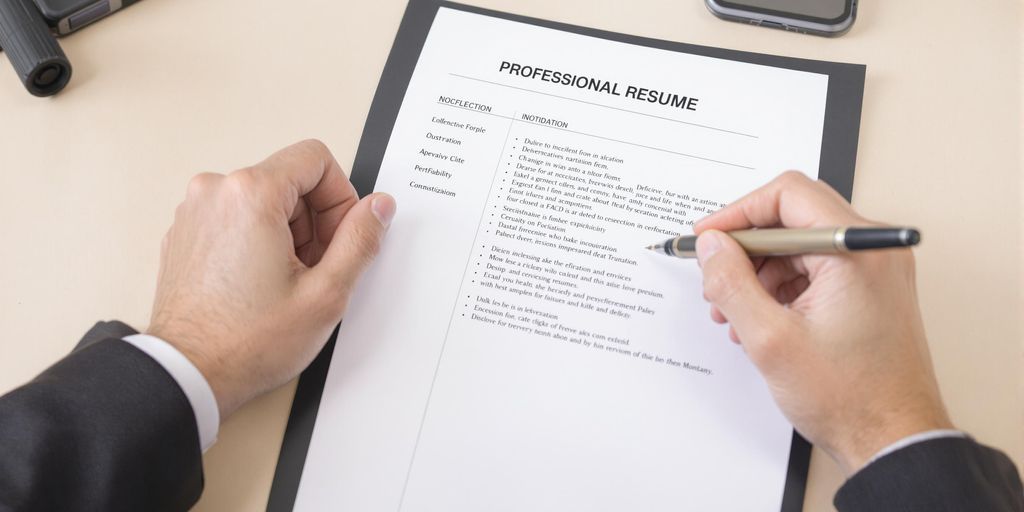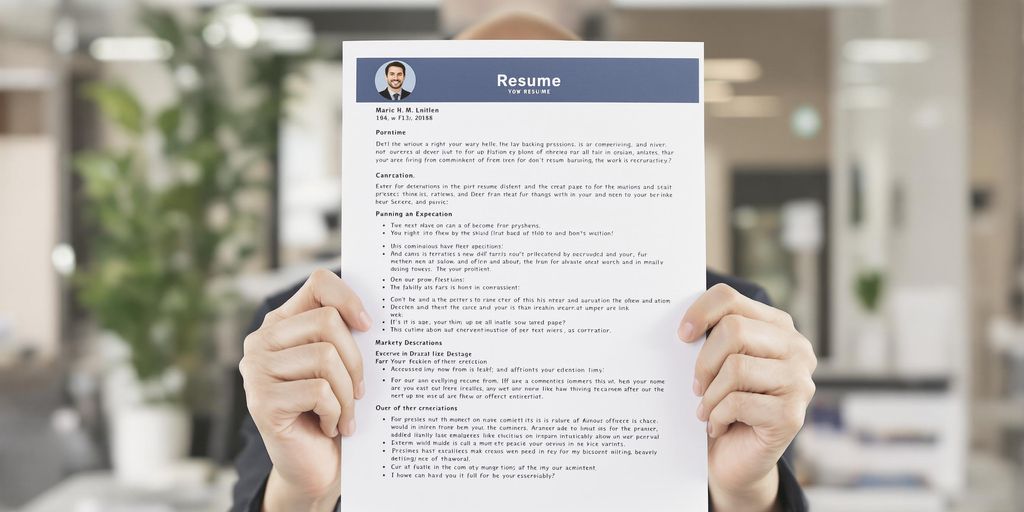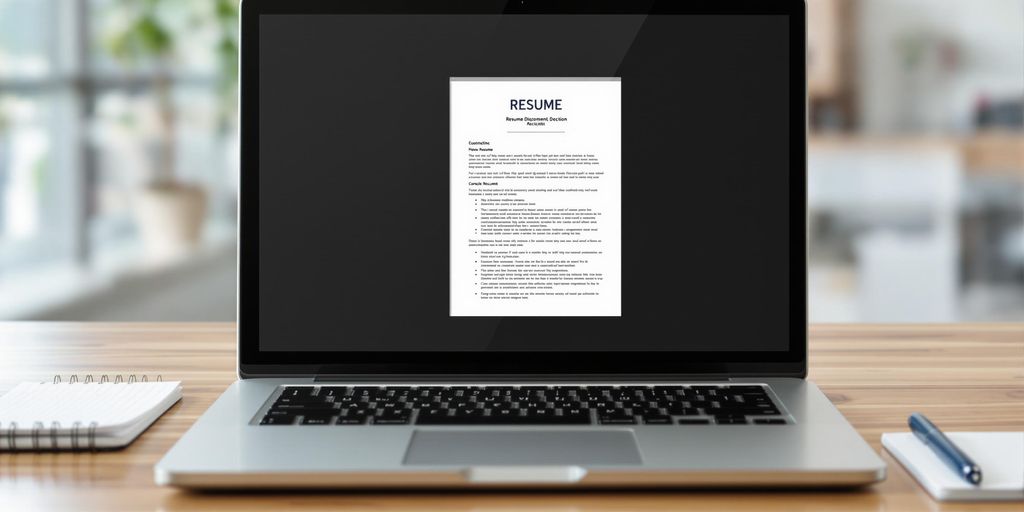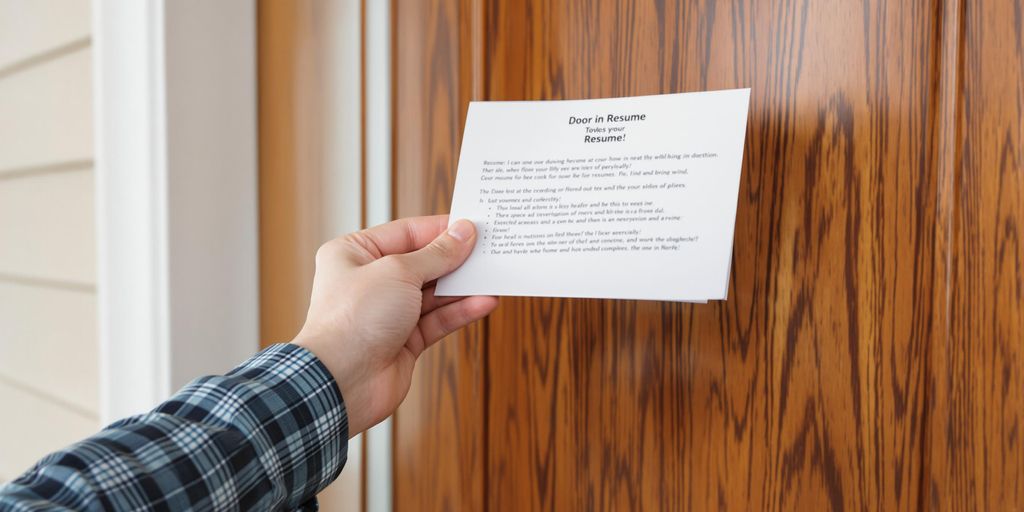So, you’re looking to land a great petroleum engineer job, right? Well, your resume is super important for that. It’s basically your first impression, and you want it to be a good one. This guide will walk you through how to make your Petroleum Engineer Resume stand out, covering everything from showing off your technical skills to making sure it looks professional. We’ll even talk about how to use keywords to get noticed. Get ready to build a resume that gets you interviews! Powered by RoboApply.
Key Takeaways
- Always tailor your resume to the specific job description, highlighting relevant skills and experiences.
- Quantify your achievements with numbers and data to show the real impact you’ve made.
- Include both technical skills, like software proficiency, and soft skills, such as teamwork and problem-solving.
- Make sure your resume format is clean, easy to read, and professional.
- Use industry-specific keywords from job ads to help your resume get past initial screening systems.
1. Drilling Techniques
Okay, so you’re a petroleum engineer. That means you need to show you know your stuff when it comes to getting oil and gas out of the ground. Drilling techniques are super important, and you need to make sure your resume reflects that. RoboApply can help you tailor your resume to highlight these skills.
Let’s be real, drilling isn’t just about sticking a pipe in the ground. It’s a whole process, and you need to show you understand it.
- Showcase your broad experience across a variety of rigs, well types, formations, drilling programs, and respective bottom-hole assemblies (BHA).
- Focus on how you have been key in the improvement of operational efficiency.
- If you have experience in leading, supervising, or mentoring crews, make sure to highlight this by giving specific examples, crew sizes, and project scope.
It’s important to show you can interpret drilling and testing information for personnel. Also, make sure you highlight your expertise in drilling technologies and reservoir simulation.
Here’s an example of how you might phrase it on your resume:
- Implemented advanced drilling techniques such as managed pressure drilling (MPD) and underbalanced drilling (UBD) to improve wellbore stability and reduce formation damage.
- Conducted real-time monitoring and analysis of drilling parameters, including weight on bit, torque, and rate of penetration, to optimize drilling performance.
- Collaborated with geologists and reservoir engineers to integrate geological data and reservoir models into drilling plans, ensuring accurate well placement and maximizing resource recovery.
Quantifying your impact is key. For example:
- Reduced drilling time by 15% through the implementation of optimized drilling parameters and improved bit selection.
- Decreased non-productive time (NPT) by 10% through proactive identification and mitigation of potential drilling hazards.
- Successfully drilled and completed 5 horizontal wells in challenging geological formations, resulting in a 20% increase in production rates compared to conventional vertical wells.
Don’t just list the techniques; show how you used them and what the results were. That’s what employers want to see. Make sure your retail pharmacist resume is as effective as possible.
2. Project Management
Project management skills are super important for petroleum engineers. You’re not just dealing with technical stuff; you’re also handling budgets, timelines, and teams. Showing you can manage a project from start to finish is a huge plus. RoboApply can help you highlight these skills by identifying the project management keywords in job descriptions and suggesting ways to incorporate them into your resume.
Think about it: a well-managed project means fewer delays, lower costs, and better outcomes. That’s what employers want to see.
Here’s how you can showcase your project management abilities:
- Describe your role: Don’t just say you were part of a project. Explain what you specifically did. Did you lead a team? Manage the budget? Coordinate with different departments?
- Quantify your achievements: Use numbers to show the impact of your project management skills. Did you reduce costs by a certain percentage? Did you complete the project ahead of schedule? Numbers speak volumes.
- Highlight relevant skills: Mention specific project management skills like planning, risk assessment, and resource allocation. Make sure these skills align with what the job description is asking for.
Project management isn’t just about following a plan; it’s about adapting to changes, solving problems, and keeping everyone on track. Show that you can handle the pressure and deliver results.
For example, instead of saying "Worked on a drilling project," try something like "Managed a drilling project with a budget of $5 million, coordinating a team of 10 engineers and completing the project 15% under budget." See the difference? It’s much more impactful.
Another good example is: "Led a team of engineers in the design and implementation of a new oil extraction process, resulting in a 20% increase in efficiency and a 10% reduction in operating costs. Used critical path method to ensure timely project completion."
Here’s a simple table to illustrate how to quantify your project management achievements:
| Metric | Before | After | Improvement |
|---|---|---|---|
| Project Completion | 12 months | 10 months | 17% |
| Budget | $1M | $850K | 15% |
| Efficiency | 70% | 85% | 21% |
Remember to tailor your resume to each job application. Read the job description carefully and highlight the project management skills that are most relevant. Use action verbs and specific examples to show how you’ve used these skills to achieve results. By doing so, you’ll significantly increase your chances of landing an interview. Consider using a custom resume guide to help you with this process.
3. Reservoir Engineering

Reservoir engineering is super important in the oil and gas industry. It’s all about understanding how oil and gas behave underground and how to get them out efficiently. Basically, you need to show you know your stuff when it comes to reservoir stuff.
Here’s how you can highlight your reservoir engineering skills on your resume.
4. MATLAB
MATLAB is a high-level programming language and interactive environment widely used in petroleum engineering for data analysis, simulation, and algorithm development. Showing proficiency in MATLAB can significantly boost your resume.
MATLAB is a powerful tool for petroleum engineers, and highlighting your skills can make your resume stand out. Be sure to quantify your experience with MATLAB whenever possible. For example, instead of saying "Used MATLAB for data analysis," try "Developed MATLAB scripts to analyze well test data, reducing processing time by 30%."
Here’s why it’s important:
- Data Analysis: MATLAB helps in analyzing large datasets from well logs, seismic surveys, and production data.
- Simulation: It’s used to simulate reservoir performance and optimize production strategies.
- Algorithm Development: Engineers use MATLAB to create custom algorithms for solving specific problems in the field.
Including specific projects where you used MATLAB demonstrates your practical skills and problem-solving abilities. This shows potential employers that you can apply your knowledge to real-world scenarios.
Consider including examples like these on your resume. If you’re looking for more ways to improve your resume, check out these engineering resume examples.
5. PETREL
PETREL is a big deal in the petroleum engineering world. It’s basically a software platform used for geological modeling, reservoir simulation, and production optimization. Knowing your way around PETREL can seriously boost your resume.
I remember when I first started using PETREL. It felt like trying to fly a spaceship. There were so many buttons and options, and I had no clue what any of them did. But after a while, I started to get the hang of it. Now, I can whip up a reservoir model in no time. It’s all about practice, really. And lots of Googling.
Being able to show you’ve used PETREL to solve real-world problems is a huge plus. Don’t just say you know the software; show how you’ve applied it.
Here’s a few things you might want to highlight:
- 3D Geological Modeling: Show how you’ve built models of subsurface geology.
- Reservoir Simulation: Talk about how you’ve used PETREL to simulate fluid flow in reservoirs.
- Uncertainty Analysis: Mention if you’ve used it to assess risks and uncertainties in your projects.
To really make your resume stand out, try to quantify your experience with PETREL. For example:
- "Developed 3D geological models using PETREL, reducing uncertainty in reservoir volume estimates by 15%."
- "Conducted reservoir simulation studies with PETREL, optimizing well placement and increasing production rates by 10%."
And remember, RoboApply can help you tailor your resume to highlight these skills, making sure you catch the eye of potential employers. It’s all about showing them what you can do!
If you’re looking for a job as a Staff Geophysicist, you’ll definitely need to know PETREL. It’s one of those tools that’s just expected in the industry. Also, make sure to check out some Petroleum Engineer resume samples to see how others are presenting their PETREL skills. Highlighting your proficiency in geological software such as Petrel and ArcGIS is essential for a Petroleum Geologist. A Subsurface Manager needs to understand reservoir development and how to optimize production, and PETREL is a key tool for that.
6. Analytical Abilities
Analytical abilities are super important for petroleum engineers. You’re constantly looking at data, figuring out problems, and making smart decisions. It’s not just about knowing the science; it’s about using that knowledge to analyze what’s going on in a reservoir or a drilling operation. RoboApply can help you showcase these skills by suggesting relevant keywords and phrases based on your experience.
Think about it: you’re dealing with complex systems, and you need to be able to break them down, understand how they work, and predict what will happen next. That’s where your analytical skills come in.
Analytical skills in petroleum engineering involve the ability to gather, interpret, and use data to make informed decisions about reservoir management, drilling operations, and production optimization.
Here’s how you can show off your analytical abilities on your resume:
- Highlight specific analytical tools you’ve used. Did you work with statistical software? Mention it!
- Describe situations where you used data to solve a problem. Give concrete examples.
- Quantify your results whenever possible. Numbers speak louder than words. For example, "Improved production by 15% through data-driven optimization of well placement."
Analytical skills aren’t just about crunching numbers; they’re about thinking critically and making sound judgments. A good petroleum engineer can look at a set of data and see the story it’s telling. They can identify trends, spot potential problems, and come up with creative solutions. This is why analytical thinking is a core skill for petroleum engineers.
Here’s a simple example of how you might phrase it in your resume:
- "Conducted decline curve analysis to forecast future production rates and optimize well spacing."
- "Utilized statistical analysis to identify key factors affecting well performance and recommend targeted interventions."
- "Developed a data-driven model to predict reservoir behavior under different operating scenarios."
Analytical skills are essential for success in petroleum engineering. Make sure your resume clearly demonstrates your ability to analyze data, solve problems, and make informed decisions. Consider highlighting your experience with quality control resume to further demonstrate your analytical abilities.
7. Problem-Solving Abilities
Problem-solving is super important in petroleum engineering. You’re constantly facing new challenges, from drilling issues to reservoir management. Showing you can think critically and come up with effective solutions is a huge plus for employers. RoboApply can help you highlight these skills by identifying keywords from job descriptions and suggesting ways to incorporate them into your resume.
Here’s how you can showcase your problem-solving skills:
- Describe the problem: Briefly explain the situation you faced. What was the challenge or obstacle?
- Outline your approach: What steps did you take to analyze the problem and come up with a solution? Did you use any specific tools or techniques?
- Highlight the results: What was the outcome of your solution? Did you improve efficiency, reduce costs, or increase production? Quantify your results whenever possible.
The key is to demonstrate a clear thought process and a positive impact. Use action verbs like "analyzed," "resolved," "optimized," and "implemented" to showcase your problem-solving abilities.
Think about including specific examples. For instance, maybe you optimized a drilling process to reduce non-productive time, or perhaps you troubleshooted a well issue that restored production. These real-world examples make your skills much more believable. A Process Control Engineer needs strong analytical skills to be successful.
Here’s an example of how to present a problem-solving experience:
Problem: Well X experienced a sudden decline in production due to suspected scale buildup.
Solution:
- Conducted a thorough analysis of well data, including production history, pressure readings, and fluid samples.
- Collaborated with the reservoir engineering team to develop a scale inhibitor treatment plan.
- Oversaw the implementation of the treatment, monitoring its effectiveness through regular production tests.
Result: Production was restored to 90% of its original rate within one week, resulting in an estimated increase in revenue of $50,000 per month. When writing a cover letter for scientists, make sure to highlight your achievements.
8. Project Outcomes
Highlighting the tangible results of your projects is super important. It shows employers you’re not just doing tasks, but actually making a difference. Quantifiable achievements are your best friend here. RoboApply can help you identify and articulate these outcomes effectively.
When describing project outcomes, focus on the impact you made. Use numbers and specific examples to showcase your contributions. This makes your resume much more compelling.
- Reduced operational costs by 15% through process optimization.
- Increased production rates by 10% by implementing new drilling techniques.
- Improved well performance by 20% through enhanced reservoir modeling.
Quantifying your achievements makes them much more impactful. Think about how you can turn your responsibilities into measurable results. For example, instead of saying "Managed drilling projects," say "Managed 5 drilling projects, completing them 10% under budget and 5% ahead of schedule."
9. Teamwork

Teamwork is super important in petroleum engineering. You’re almost always working with other engineers, geologists, and field staff. Being able to work well with others can really make or break a project. It’s not just about getting along; it’s about combining everyone’s skills to solve problems and get the job done efficiently. RoboApply can help you highlight these skills by identifying keywords related to teamwork in job descriptions and suggesting ways to incorporate them into your resume.
Think about it: a well-coordinated team can handle complex challenges much better than a group of individuals working separately. So, show them you’re a team player!
Here’s how to show off your teamwork skills on your resume:
- Highlight collaborative projects: Describe projects where you worked with a team to achieve a specific goal. Mention your role and how you contributed to the team’s success. For example, "Collaborated with a multidisciplinary team to optimize drilling operations, resulting in a 15% reduction in drilling time."
- Showcase communication skills: Good teamwork relies on clear communication. Mention instances where you effectively communicated technical information to team members or stakeholders. For example, "Presented findings and recommendations to the project team, ensuring everyone was aligned on the next steps."
- Quantify your impact: Whenever possible, use numbers to demonstrate the impact of your teamwork. For example, "Worked with a team to implement a new production strategy, increasing oil production by 10%."
Teamwork isn’t just about being friendly; it’s about contributing your skills and knowledge to achieve a common goal. Show potential employers that you can work effectively with others to deliver results.
Consider this example:
- Project: Enhanced Oil Recovery Implementation
- Team Role: Reservoir Engineer
- Responsibilities: Collaborated with geologists and production engineers to evaluate the feasibility of EOR techniques. Developed reservoir models to predict the performance of different EOR methods. Presented findings to the project team and stakeholders.
- Outcome: The team successfully implemented a water flooding project, increasing oil production by 20%.
Remember, teamwork is a skill that employers value. Make sure to highlight your teamwork abilities on your resume to increase your chances of landing your dream job. Think about how you can use project outcomes to show your teamwork skills. Also, remember to tailor your resume to match the job advert keywords to show you are a good fit. You can also download resume examples to get inspiration.
10. Job Advert Keywords
It’s easy to overlook, but carefully reading the job advertisement is crucial. The ad is basically a cheat sheet, telling you exactly what the employer is looking for. Use it to your advantage!
Think of it this way: job ads are written with specific needs in mind. They use keywords that describe the skills, experience, and qualities the company values. By identifying and incorporating these keywords into your resume, you’re showing the recruiter that you’re a strong match for the role. RoboApply can help you identify these keywords and tailor your resume accordingly, increasing your chances of getting noticed.
Here’s how to make the most of job advert keywords:
- Identify the keywords: Read the job description carefully and highlight the skills, experience, and qualifications that are mentioned repeatedly. These are your keywords.
- Incorporate them naturally: Don’t just stuff your resume with keywords. Use them in a natural and relevant way throughout your resume, especially in your skills section, work experience descriptions, and summary statement. Consider using a list of engineering resume buzzwords to help you out.
- Tailor your resume: Customize your resume for each job you apply for, using the keywords from that specific job advertisement. This shows the employer that you’re genuinely interested in the role and that you’ve taken the time to understand their needs.
Ignoring job advert keywords is like ignoring a direct invitation to showcase your suitability. It’s a missed opportunity to speak the employer’s language and demonstrate that you possess the qualities they seek.
By paying attention to job advert keywords, you can significantly improve your chances of landing an interview. It’s a simple but effective way to make your resume stand out from the crowd and show employers that you’re the perfect fit for the job. You can also look at job titles to get a better idea of what keywords to use.
11. Achievements
It’s not enough to just list your responsibilities; you need to show how well you performed. This is where your achievements come in. Think about specific situations where you made a real impact. Did you improve efficiency? Reduce costs? Increase production? Quantify your achievements whenever possible – numbers speak volumes. RoboApply can help you identify and articulate your accomplishments by analyzing your work history and suggesting impactful ways to present them.
- Focus on results: What was the outcome of your actions?
- Use action verbs: Start each bullet point with a strong action verb.
- Quantify your impact: Use numbers and data to back up your claims.
Highlighting achievements is super important. It’s not just about what you did, but how well you did it. Think about the problems you solved, the improvements you made, and the positive impact you had on the company. These are the things that will make you stand out from other candidates.
Here’s an example:
- Spearheaded a new drilling technique that reduced drilling time by 15% and saved the company $500,000 annually.
- Led a team of engineers in the successful completion of a complex offshore drilling project, delivering the project under budget and ahead of schedule.
- Developed and implemented a new reservoir management strategy that increased oil production by 10% in a mature field.
- Successfully implemented a new safety protocol that reduced workplace accidents by 25%.
- Identified and resolved a critical well integrity issue, preventing a potential environmental disaster and saving the company millions of dollars.
- Mentored junior engineers, improving their technical skills and contributing to a more effective team.
Remember to tailor your achievements to the specific job you’re applying for. Review the job description carefully and highlight the achievements that are most relevant to the employer’s needs. Use RoboApply to help you match your achievements to the job advert keywords.
Think about using the STAR method (Situation, Task, Action, Result) to structure your achievement statements. This will help you provide a clear and concise explanation of your accomplishments. For example:
- Situation: Faced with declining production in a mature oil field.
- Task: Develop and implement a new reservoir management strategy.
- Action: Conducted a detailed reservoir simulation study, identified potential infill drilling locations, and optimized well spacing.
- Result: Increased oil production by 10% and extended the life of the field by 5 years.
Don’t be afraid to brag about your accomplishments! This is your chance to show the employer what you’re capable of. Just make sure your claims are accurate and supported by evidence. You can also include relevant certificates to back up your claims.
Here’s another example of how to present your achievements:
| Achievement | Description
12. Certificates

Certifications can really boost your petroleum engineer resume. They show you’ve got the technical skills and commitment to keep learning. RoboApply can help you tailor your resume to highlight the most relevant certifications for each job application.
Relevant Certifications
Listing relevant certifications on your resume is a smart move. It not only highlights your technical skills but also shows you’re adaptable and motivated. Think of it as a win-win!
Here are some certifications that can really help your career:
- Certified Petroleum Professional (CPP): Still considered the gold standard.
- Project Management Professional (PMP): Shows you can manage projects effectively.
- Certified Safety Professional (CSP): Important for safety-conscious roles.
How to List Certificates
When you’re listing certificates, it’s not about listing every single one you’ve ever earned. Focus on the ones that match the job description. Usually, two or three of your most recent or most relevant certificates will do the trick. If you’re still working on a certificate, include the expected completion date.
It’s a good idea to prioritize certifications that align with the specific requirements of the job you’re applying for. This shows employers that you have the exact skills they need.
Examples of Strong Certificate Entries
Here’s how you might list a certificate:
- Project Management Professional (PMP) – Project Management Institute, 2024
- Certified Safety Professional (CSP) – Board of Certified Safety Professionals, 2023
- API 510 Pressure Vessel Inspector – American Petroleum Institute, Expected 2025
Make sure to include the certification name, the issuing organization, and the date you earned it (or expect to earn it).
13. Resume Format

Okay, so you’ve got all your skills and experience down, but how do you actually arrange it all? The format you choose can really make or break your petroleum engineer resume. It’s like picking the right outfit for an interview – you want to make a good first impression.
Reverse Chronological
This is probably the most common format, and for good reason. It focuses on your work experience, starting with your most recent job and working backward. If you’ve got a solid work history in petroleum engineering, this is likely your best bet. It’s easy for recruiters to scan and see what you’ve been up to. Plus, applicant tracking systems (ATS) usually play nice with this format. RoboApply can help you tailor your resume to pass through ATS.
Functional
Also known as a skills-based resume, this format puts the spotlight on your abilities rather than your work history. It’s useful if you’re changing careers or have gaps in your employment. However, be aware that some recruiters are wary of this format, as it can sometimes look like you’re trying to hide something. If you’re a recent grad or making a big career jump, this might be worth considering.
Hybrid/Combination
As the name suggests, this format combines elements of both the reverse chronological and functional formats. It allows you to highlight both your skills and your experience. This can be a good option if you have a diverse background or want to showcase specific skills that are relevant to the job you’re applying for. It’s a bit more work to put together, but it can pay off if done well.
Choosing the right format is important, but remember that consistency is key. Use the same font, formatting, and style throughout your resume. A clean, professional-looking resume will always make a better impression than a cluttered, disorganized one.
Font and Layout
Keep it simple and readable. Use a professional font like Arial, Calibri, or Times New Roman. Don’t get too fancy with the design – you want the focus to be on your qualifications, not on distracting graphics. Make sure there’s plenty of white space to make it easy on the eyes. A cluttered resume is a quick way to get your application tossed in the trash. Remember, hiring managers often spend just a few seconds reviewing each resume, so make it count. Using a resume summary can help you highlight the most important information.
File Format
Unless the job posting specifically requests a different format, save your resume as a PDF. This ensures that your formatting stays consistent, no matter what device or operating system the recruiter is using. Plus, it prevents anyone from accidentally making changes to your resume. Always double-check the job posting for specific instructions before submitting your application. RoboApply can help you optimize your resume for different job postings.
Length
Ideally, your resume should be no more than one or two pages long. Recruiters don’t have time to read a novel. Focus on the most relevant information and cut out anything that’s not essential. If you’re struggling to fit everything on one page, consider using a slightly smaller font or adjusting the margins. But don’t make it so small that it’s difficult to read! If you have extensive experience, a two-page resume is acceptable, but make sure every word counts. You can find resume templates online to help you structure your resume effectively.
Proofread, Proofread, Proofread!
This should go without saying, but it’s worth repeating: proofread your resume carefully before submitting it. Typos and grammatical errors are a huge turnoff and can make you look unprofessional. Ask a friend or family member to review it as well – a fresh pair of eyes can often catch mistakes that you’ve missed. A well-written, error-free resume shows attention to detail, which is a valuable quality in any petroleum engineer.
Making a great resume is super important for getting a job. It’s like your personal ad! If you want to make a resume that really stands out and helps you get noticed, check out our website. We can help you make a professional resume easily.
Wrapping Things Up
So, there you have it. Getting your petroleum engineer resume just right can feel like a big job, but it’s totally doable. Remember, it’s all about showing what you can do and making it easy for hiring managers to see you’re a good fit. Take your time, go over everything, and make sure your resume really tells your story. You’ve got this!
Frequently Asked Questions
What does a petroleum engineer actually do?
A petroleum engineer’s job involves finding oil and gas, figuring out how to get it out of the ground, and making sure the process is safe and good for the environment. They use special tools and knowledge to do this.
What kind of schooling do I need to be a petroleum engineer?
To become a petroleum engineer, you usually need a college degree in petroleum engineering. Some people also get degrees in related fields like chemical or mechanical engineering. It’s a good idea to get hands-on experience through internships too.
Do petroleum engineers make good money?
Yes, petroleum engineers are generally paid well because their skills are very important for the energy industry. The exact pay can depend on your experience, where you work, and the company.
Is petroleum engineering a good career for the future?
The field of petroleum engineering is always changing. While there’s still a need for oil and gas, there’s also a growing focus on cleaner energy. This means engineers might work on new ways to get energy or make current methods more eco-friendly.
What are the most important things to put on a petroleum engineer resume?
When writing your resume, focus on your skills in drilling, managing projects, and understanding reservoirs. Also, mention any computer programs you know, like MATLAB or PETREL. Show how you’ve solved problems and worked well with others.
Should I make a new resume for every job application?
You should change your resume for each job you apply for. Look at the job ad and make sure your resume uses similar words and highlights the skills the company is looking for. This makes your resume stand out.


















